By Cass Mason for Newsroom
One of New Zealand's wealthiest and most high-profile part-time residents is raising questions after he disappeared from the country, stalling a drink-driving trial and leaving hundreds of thousands of dollars in donations to cycling and football unpaid.
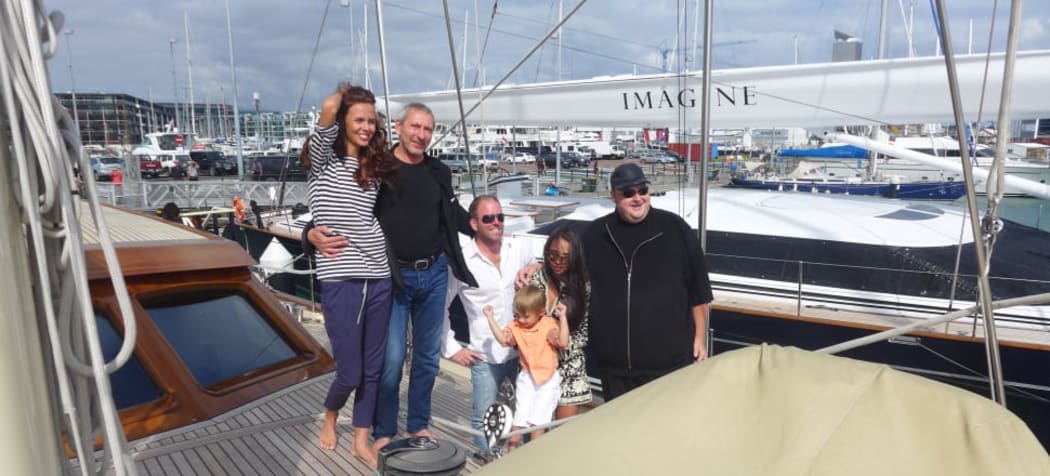
Mikhail Khimich with his girlfriend, Belarussian model Maria Dzidirava, and Kim Dotcom on Khimich's super yacht Thalia. Photo: Supplied
Russian businessman and reported billionaire Mikhail Khimich, who first came to New Zealand on his super yacht Thalia in 2008, bought Waiwera's bottled water and thermal pools in 2010. Since then, he has gained recognition as a generous benefactor of New Zealand sport and as a staple at glamorous openings and events, gaining residency in 2013.
A string of unusual events have unfolded around the former owner of the well-known New Zealand Waiwera Water brand, which markets its artesian water as having been a 'New Zealand treasure for centuries'.
Today in the Auckland District Court, Khimich again failed to show up for a hearing in a case that has dragged on for three years.
Waiwera Thermal Resort was put into liquidation in February this year, and Waiwera Water NZ and Waiwera Global were put into liquidation in mid-May, following speculation around why the Russian billionaire's business ventures here had struggled, and about the future of the small resort town north of Auckland that gives the brand its name.
All three Waiwera companies are now wholly owned by Las Vegas-based Ordover Trust, headed by reported diamond trader Leon Fingerhut. Fingerhut is also a director of all three companies, with Khimich.
Unusually, Companies Office documents show Khimich signed three directors' consent forms on behalf of Fingerhut.
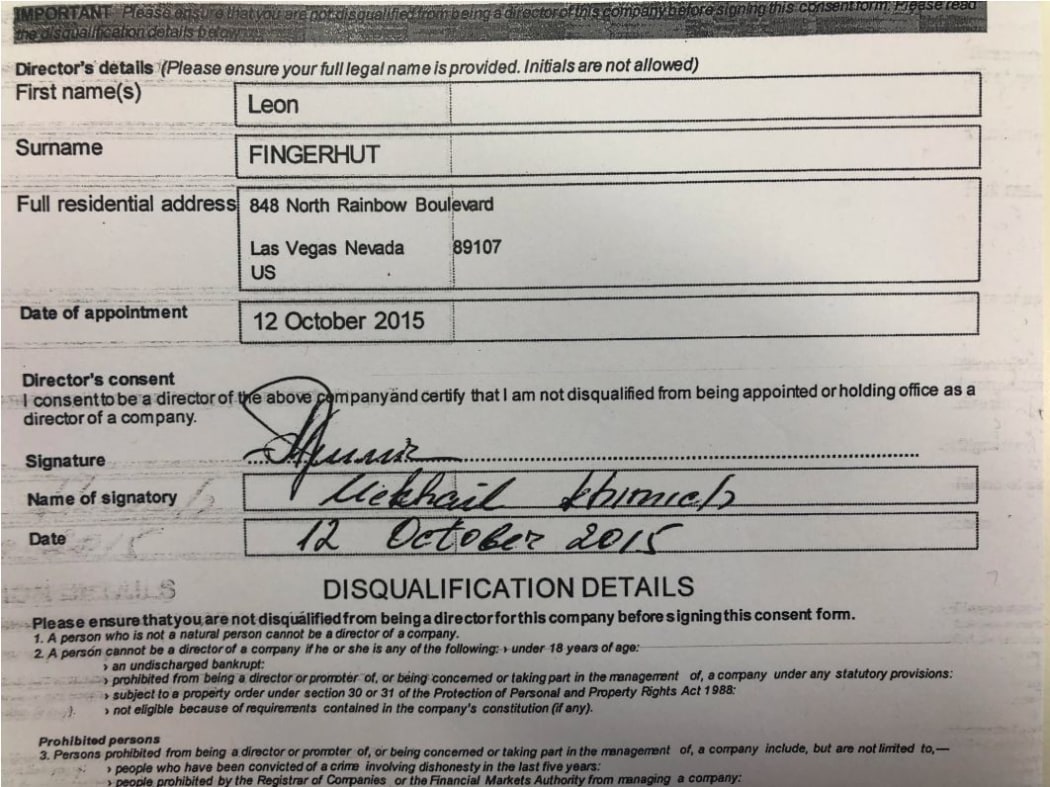
Photo: Companies Office
Asked about the form, a Companies Office spokesperson told Newsroom: "Director consent forms are required to be signed by the person named as director. The Companies Office does not know why the form appears to show that Mr Khimich has signed the consent forms and will refer this matter to the Registrar's Integrity and Enforcement Team to review and discuss with [the] liquidator if required."
Khimich enjoyed relatively positive media coverage in this country until recently, and moved in high-profile social circles with the likes of Kim Dotcom and people in politics.
However, a first drink-driving charge in 2013 was thrown out over translation problems, and a second has been dragging out in court for nearly three years.
Questions about his connection to Russian military intelligence arose following reports the Russian energy company he co-owned - a major supplier of oil and gas to the Russian military - was caught up in a US bribing scandal.
The scandal held up Khimich's application to buy into Waiwera for two years, although the Overseas Investment Office eventually deemed him of "good character".
However, a Washington insider and expert in Russian military intelligence, J. Michael Waller, who worked closely with the lobbyist at the centre of the scandal, says he believes the company, Naftasib, and its agents were running an "aggressive" political intelligence operation against the US.
Khimich has hosted Naftasib bosses on his super yacht in New Zealand on a number of occasions, and maintains a close relationship with them.
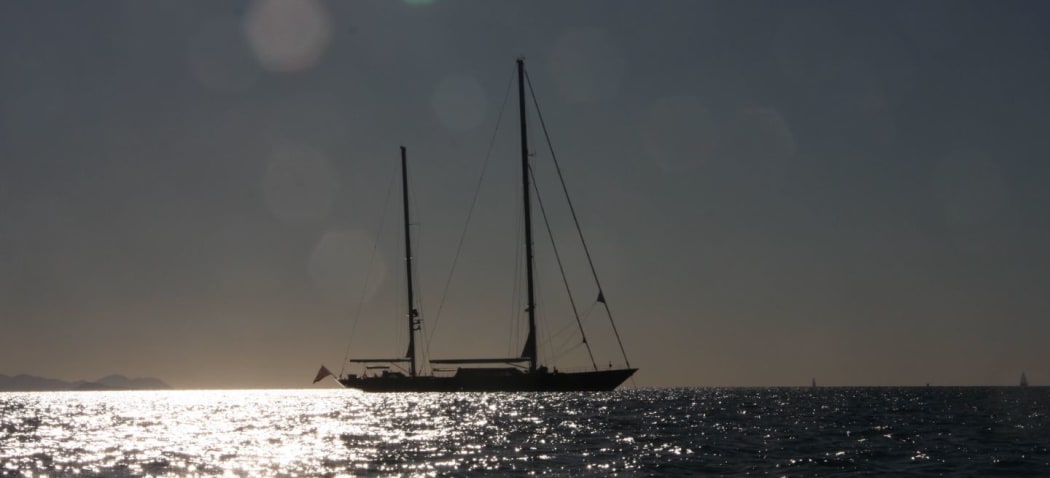
Mikhail Khimich's super yacht Thalia. Photo: Supplied
Now the magnate has all but disappeared, leaving his court proceedings for a 2016 drink driving charge in limbo, the Waikato Avantidrome and NZ Football with only part of the money promised to them, with the business' other debts put at $5 million.
After the DIC charge from 2013 was dropped on language difficulties, Khimich tried to have his second charge thrown out on the basis of inadmissibility of evidence.
After that was denied in the High Court, a series of no-shows have stalled proceedings for three years, the latest of which was yesterday.
At the previous appearance he was deemed medically unfit to fly back from Russia after having emergency surgery.
In today's hearing, Khimich again failed to show, with lawyer John Clearwater telling the court his client was still "in a pretty serious situation medically."
"I don't believe that the problems he has are going to disappear."
However, Judge Andrea Manuel noted that while the medical certificate presented at his last intended appearance stated Khimich's condition prevented him from flying, a certificate presented to the court since then did not.
"There's absolutely no confirmation he can't fly. This medical certificate isn't satisfactory and I'm very concerned about the delays."
Clearwater would not provide Newsroom with any information about Khimich, his condition or his whereabouts. He said he would have to ask permission and would need a week to do so.
Khimich endeared himself with some New Zealanders with his support for local sport.
In 2014, he met privately with the Duke and Duchess of Cambridge after pledging $1 million to the national velodrome.
He agreed to donate the sum over three years, before being granted a private audience with the royal couple at the Avantidrome's official opening.
But general manager of the Avantidrome, Scott Gemmill, says the commitment "was not honoured".
"When I joined [as general manager], there was a considerable amount still outstanding."
Gemmill said Khimich failed to donate $300,000 of the amount promised.
A pledge of $57,500 to NZ Football also went unpaid, prompting the organisation to threaten liquidation against Waiwera Water NZ a year before it went into liquidation.
NZ Football signed a 12-month sponsorship deal worth $57,500 in 2016 but a letter of demand dated March 8, 2018 shows it didn't receive any of the money.
Its lawyers Shieff Angland contacted Waiwera Water NZ threatening to put the company into liquidation if it didn't receive the money owed.
Contacted by Newsroom, NZ Football declined to comment because of the commercial nature of the matter.
According to a report from liquidators Staples Rodway, Waiwera Thermal also owes KiwiBank $1.29 million in unpaid loans plus upwards of $3 million to other creditors.
However, some of Khimich's pledges were honoured.
Khimich famously donated half a million dollars to Team New Zealand the day after their crushing America's Cup loss in 2013, completing a total of $1 million.
Team NZ manager Grant Dalton said he "met his obligation 100 percent".
"There was no issue and he was honourable in all his dealings."
As well as the $1 million in support, he also supplied the team with Waiwera Water at no cost.
Khimich's connection to controversial Russian figures was what initially stalled his plans to buy Waiwera hot pools and water bottling operations.
Between 1999 and 2006, Khimich owned half of the Russian energy company Naftasib, with its other owner, Alexander Koulakovsky and vice-president Marina Nevskaya. Before that, he had acted as the company's general manager.
Naftasib became embroiled in a scandal after it was reported the company funnelled more than US$2 million to Washington lobbyist and insider Jack Abramoff in fees between 1997 and 2004, plus another $1 million that went to a non-profit used as a front company by someone close to congressman Tom Delay. The payment was intended to influence Delay's vote on legislation that would allow the International Monetary Fund to bail out the failing Russian economy.
At the time, Nevskaya denied the company made the $1 million payment and said she didn't know about the other transaction.
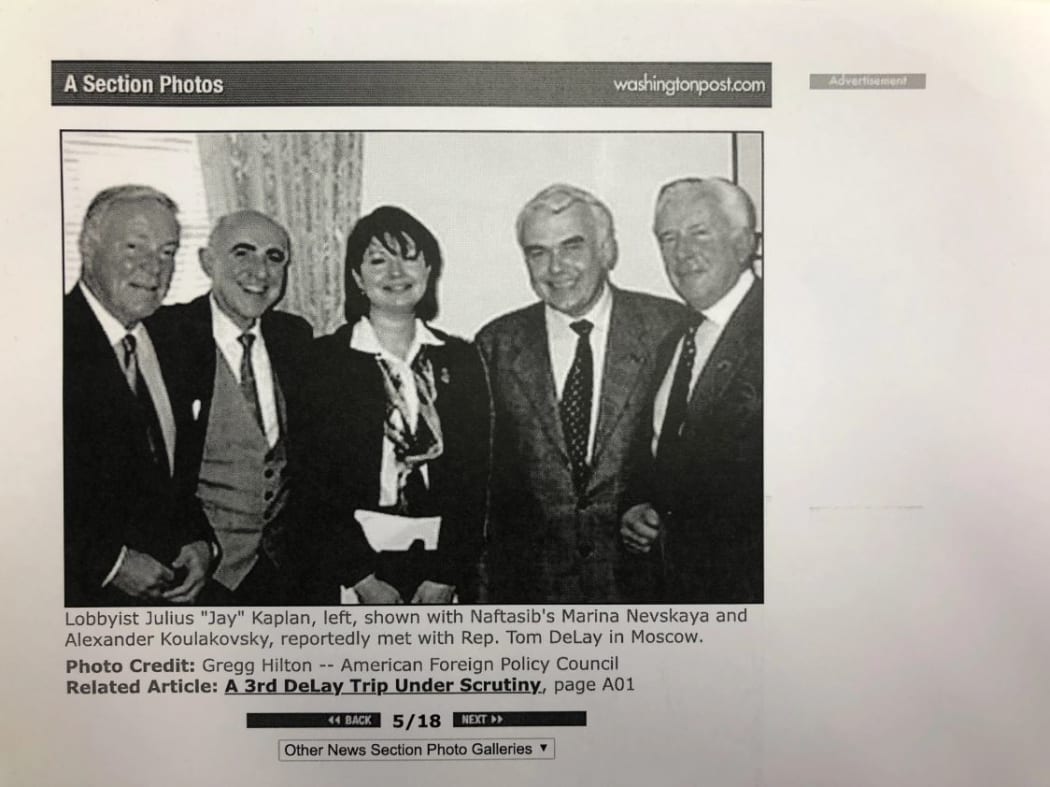
A photo of Naftasib's Marina Nevskaya and Alexander Koulakovsky that ran in the Washington Post around the time of the scandal in the early 2000s. Photo: Supplied
Khimich told the OIO any dealings Nevskaya and Koulakovsky had with US politicians and lobbyists was done in a personal capacity rather than that of Naftasib, and he was eventually cleared of suspicion.
However, Waller, a former Washington insider and US expert in Russia's intelligence services, told Newsroom:
"In my estimation, Naftasib and its agents were running what appeared to be an aggressive political intelligence operation against the United States. All the indicators were consistent with the pattern of a Russian state-sponsored entity working to corrupt elected American officials and I had warned people of this possibility and that was my position more than a decade ago and that remains my position today."
Waller worked for Abramoff in the 1980s, but quit when he suspected Abramoff of wrongdoing (Abramoff was later convicted of corruption) and is currently the vice-president of non-profit, the Center for Security Policy.
A journal published by Washington think-tank the American Foreign Policy Council in 1997 quoted promotional literature for Naftasib that said Nevskaya was an instructor at a school for Russian military intelligence officers.
The journal, Russian Reform Monitor, also highlighted what it described as Naftasib's tight connections to the Russian security establishment and pointed to promotional literature in which the company described itself as a major shareholder in the state-controlled oil and gas giant Gazprom.
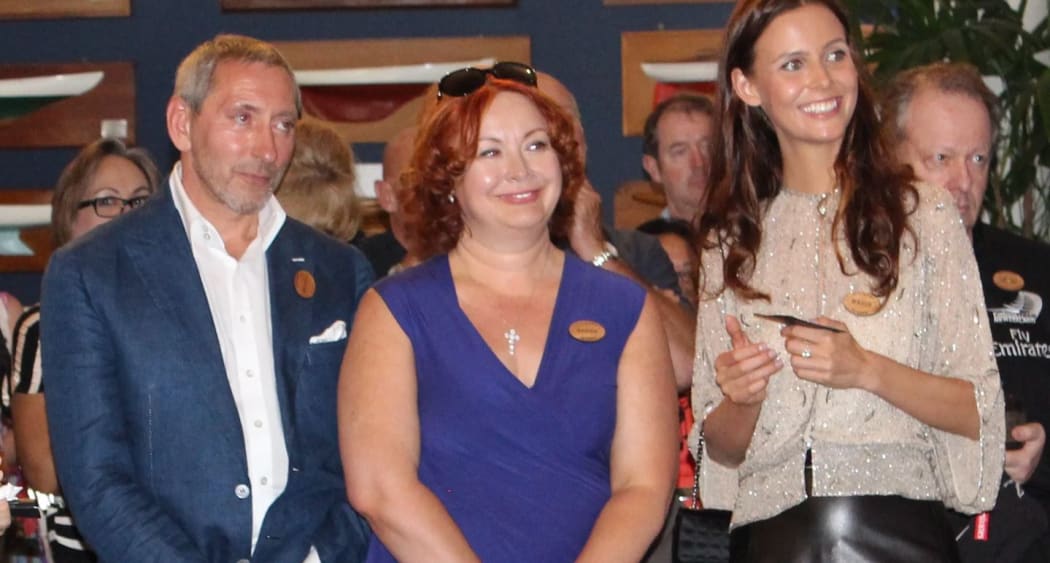
Marina Nevskaya, centre, has been photographed in New Zealand a number of times. Here she is with Mikhail Khimich and Khimich's girlfriend Maria Dzidirava. Photo: Supplied
That same material said Nevskaya trained at the Military Diplomatic Academy in Moscow.
Khimich maintains an ongoing relationship with Nevskaya and Koulakovsky - especially Nevskaya, who has been photographed with Khimich in New Zealand on a number of occasions.
Khimich is also connected to a known ex-KGB bioterrorism expert, who has been living in New Zealand since 1994, and has gone on to hold positions at MPI and the Waikato Regional Council.
Alexander Kouzminov was a KGB operative in the USSR and Russia in the 1980s and 1990s, where he helped implement plans for biological espionage and biological warfare.
The pair were linked through a company, the Robert Graham Institute for Natural Waters of New Zealand.
Kouzminov was the company's director between 2011 and 2013, when Khimich took over the directorship on March 22, 2013 - a position he still holds today.
A former Waiwera employee said Kouzminov was a regular visitor of Khimich and the two were close.
Kouzminov's background was well-documented in a book he wrote himself called Biological Espionage: Special Operations of the Soviet and Russian Foreign Intelligence Services in the West, published in 2006.
He has been in New Zealand since as far back as 1995, when he attended the University of Auckland, studying for a PhD in law. He now works as a senior policy advisor at Waikato Regional Council.
Incidentally, he also had a drink-driving charge thrown out in 2014 after testing more than twice the legal limit. The reason? His lawyer successfully argued a conviction would prevent him travelling overseas as a consultant for several foreign intelligence agencies, as reported in the Otago Daily Times in February 2014.
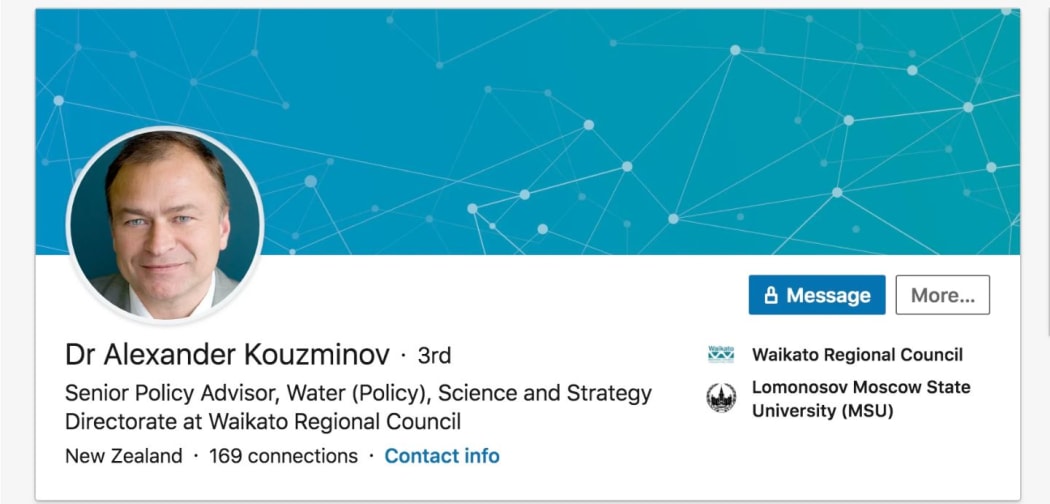
Former KGB bioterrorism agent Alexander Kouzminov previously held a position at MPI, and now works at Waikato Regional Council. Photo: Screenshot
When contacted, Kouzminov said he couldn't comment as he hadn't seen Khimich in several years.
The Russian Embassy in New Zealand also said it knew nothing of his whereabouts.
"The Embassy knows about the situation with Mikhail Khimich from the New Zealand press. Unfortunately, we don't have any additional information including on where he is."
New Zealand security expert Paul Buchanan told Newsroom avoiding a drink-driving charge in court for three years was "indication of his protected status in Russia and, less pleasantly, the delicacy with which MFAT and successive governments have treated this case".
He said Russian billionaires abroad by definition were operating "in the good graces of the Russian government" and were an asset to their country.
"They owe their fortunes to how the post-Soviet game was played," he said
"There is the fact that money opens doors and greases wheels."
Buchanan spoke out last year following Prime Minister Jacinda Ardern's comments about the Salisbury poisoning, when she said New Zealand had "no Russian undeclared intelligence officers here".
He told media at the time that "of course" there were undeclared Russian intelligence agents in the country, likely a small number who were perhaps military personnel.
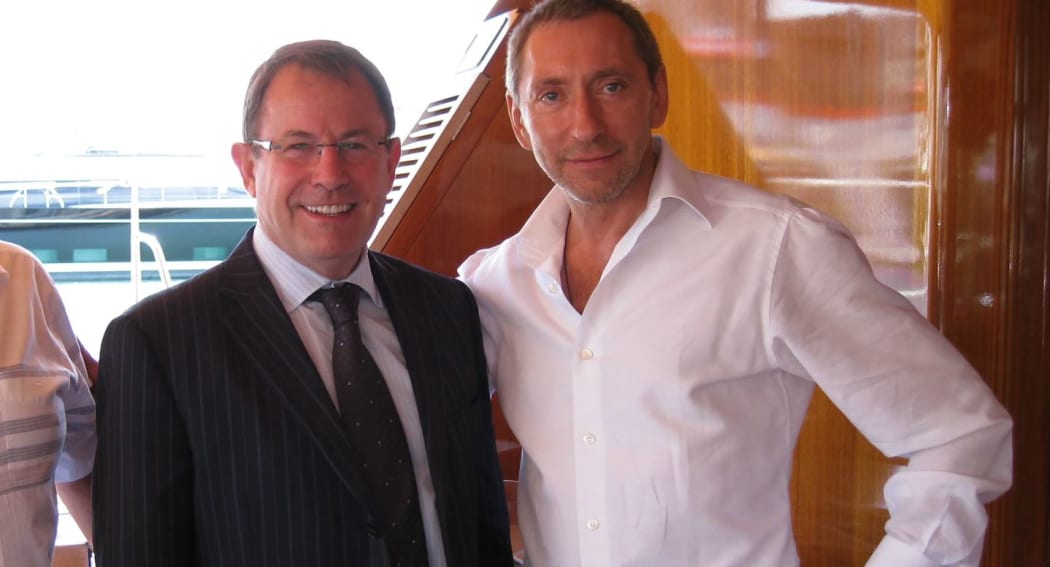
Mikhail Khimich hosts former Auckland Mayor John Banks on Thalia. Photo: Supplied
______
Khimich's former business associate, New Zealand citizen Alexander Kirichuk - formerly of the Ukraine - says Marina Nevskaya was a frequent visitor to New Zealand, where she was hosted by Khimich on his super yacht Thalia.
Nevskaya's presence was superficially described as that of a translator, but Kirichuk says she herself told him she was a "colonel-lieutenant in the GRU" (an abbreviation for the Main Directorate of the General Staff of the Armed Forces of the Russian Federation).
"It was clear who was the boss in the situation."
Journalists from the Herald on Sunday also spent time with Khimich and Nevskaya, with Khimich's girlfriend, Belarussian model Maria Didarova, on Thalia, for the paper's 'Spy' pages under the heading 'The spy who loved us' in February 2013.
The article reports that Nevskaya told the journalists she was "former Russian intelligence", which was written off as a joke.
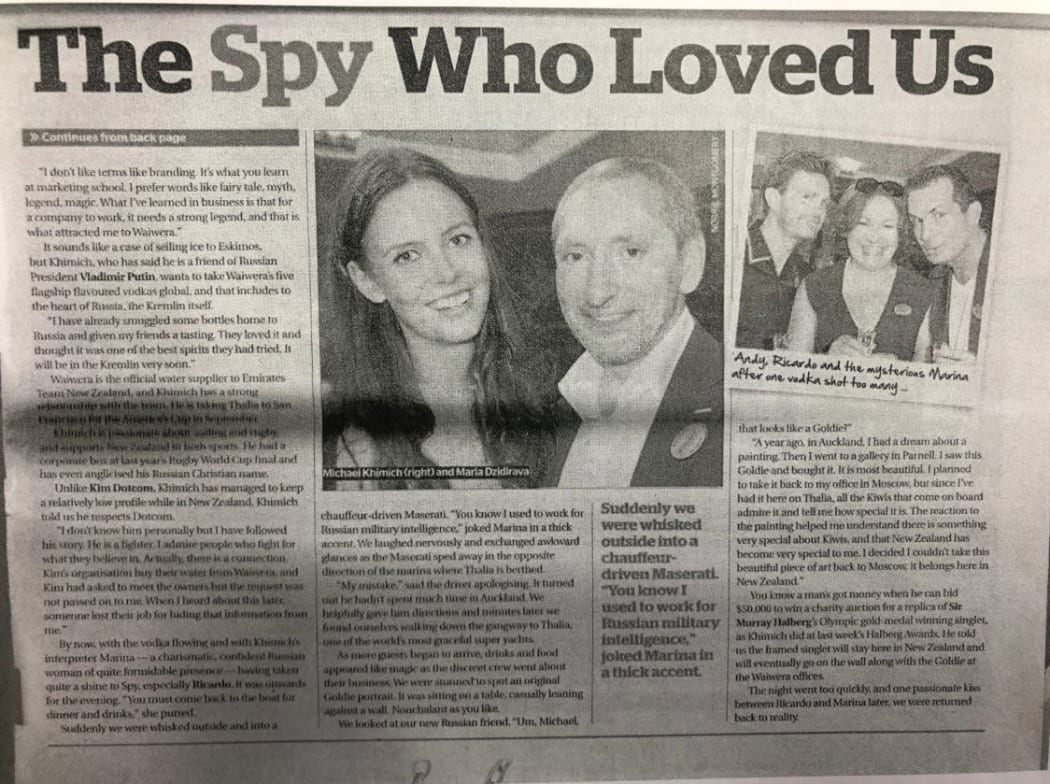
This piece from the Herald's Spy pages referred to the 'mysterious Marina' and how Khimich was friends with Putin, seemingly taking everything at face value. Photo: Supplied
Alexander Kirichuk is the founder and owner of Puhoi Organic Distillery, which he runs making organic spirits with his wife, a medical doctor, and his daughter Victoria, a former police officer.
He says he worked as a nuclear engineer in the Ukraine, and was a government inspector at Chernobyl. Kirichuk moved to New Zealand in 2002 and joined Khimich in the Waiwera Organic Winery as a shareholder and an advisor in 2009, after the pair connected over their mutual interest in yachting.
Kirichuk also acted as a translator for Khimich when he made the deal to buy the Waiwera Thermal Resort from John St Clair Brown in 2010.
The business relationship soured after a Russian who moved in similar circles attempted to "recruit" Victoria Kirichuk, a police officer at the time.
After declining the offer - which included payment "three times" as much as her police salary to access the police database - she claims a harassment campaign was waged against her and her family, which included multiple death threats and instances of intruders on their property during the night.
The family filed multiple reports about the attempt and subsequent incidents with police, SIS, the US consulate, and the IPCA - copies of which have all been provided to Newsroom.
They say their efforts were never properly addressed.
This story first appeared on Newsroom

